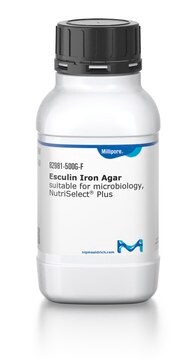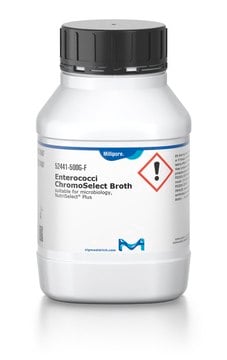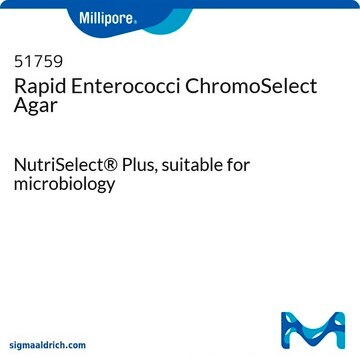Fontos dokumentumok
48300
Bile esculin agar
suitable for microbiology, NutriSelect® Plus
Szinonimák:
Esculin Bile Agar
About This Item
Javasolt termékek
Ügynökség
according to ISO 10273:2017
Minőségi szint
sterilitás
non-sterile
termékcsalád
BioChemika
Forma
powder
eltarthatósági idő
limited shelf life, expiry date on the label
összetétel
agar, 15.0 g/L
esculin, 1 g/L
ferric citrate, 0.5 g/L
meat extract, 3 g/L
meat peptone, 5 g/L
ox-bile, 40 g/L
gyártó/kereskedő neve
NutriSelect® Plus
technika/technikák
microbe id | specific enzyme detection: suitable
végső pH
6.6±0.2 (25 °C)
alkalmazás(ok)
environmental
food and beverages
water monitoring
microbiology
alkalmasság
Streptococcus spp.
selective and differential for Enterococcus spp.
Alkalmazás
Elkészítési megjegyzés
Lábjegyzet
The designations basic, plus, or prime are added to indicate the quality control level, from basic quality control to standard QC plus to prime for full regulatory compliance.
Jogi információk
Tárolási osztály kódja
11 - Combustible Solids
WGK
WGK 3
Lobbanási pont (F)
Not applicable
Lobbanási pont (C)
Not applicable
Válasszon a legfrissebb verziók közül:
Már rendelkezik ezzel a termékkel?
Az Ön által nemrégiben megvásárolt termékekre vonatkozó dokumentumokat a Dokumentumtárban találja.
Az ügyfelek ezeket is megtekintették
Cikkek
Microbiological assessment of bacteria found in spices, a potent source for food spoilage and pathogens.
Tudóscsoportunk valamennyi kutatási területen rendelkezik tapasztalattal, beleértve az élettudományt, az anyagtudományt, a kémiai szintézist, a kromatográfiát, az analitikát és még sok más területet.
Lépjen kapcsolatba a szaktanácsadással












